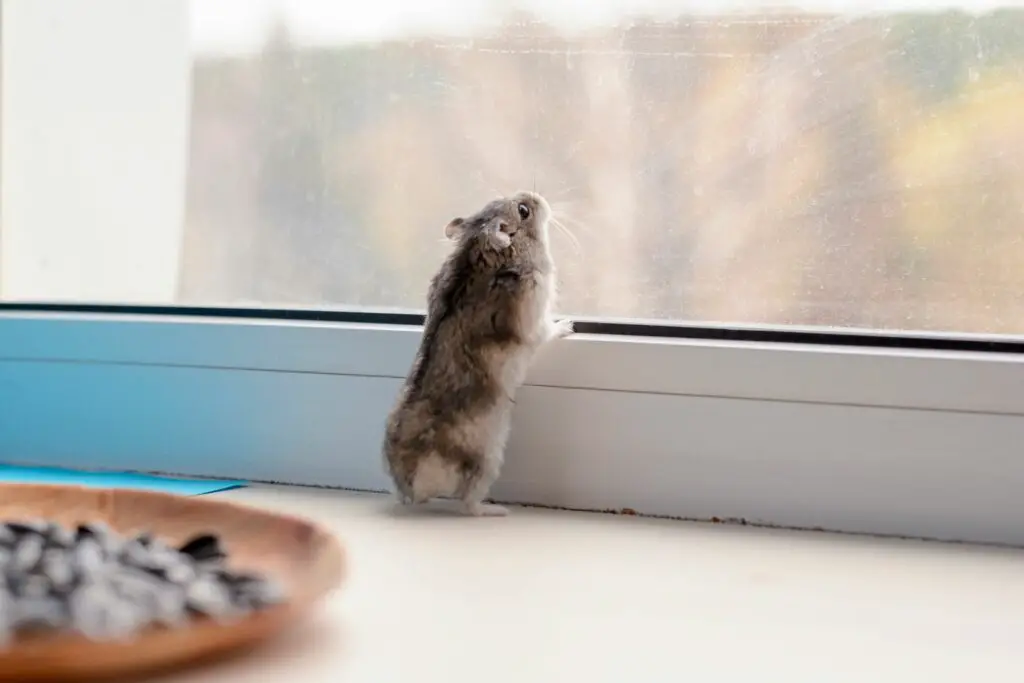As a hamster owner, one of the questions I get asked a lot about hamsters is whether they are nocturnal, crepuscular, or diurnal. This is an important question as it helps owners understand the natural sleep pattern of their furry friend and provide them with the best care possible.
In this blog post, I will explain the differences between nocturnal, crepuscular, and diurnal animals, and discuss which category hamsters fall into.

What is Nocturnal?
Nocturnal animals are those that are active during the night and sleep during the day. This means that their eyes are adapted to low light conditions and they have excellent night vision.
Nocturnal animals have evolved to sleep during the day in order to avoid predators and hunt for food during the night when it is cooler.
Examples of nocturnal animals include owls, bats, and hedgehogs. When it comes to hamsters, they are often believed to be nocturnal animals because they are most active during the night.
What is Crepuscular?
Crepuscular animals are those that are most active during dawn and dusk. They have evolved to be active during these times in order to forage for food and avoid predators.
Crepuscular animals have adapted their senses to low light conditions, but their eyes are not as well adapted for night vision as nocturnal animals.
Examples of crepuscular animals include deer, rabbits, and skunks. When it comes to hamsters, some experts argue that they may actually be crepuscular rather than nocturnal.
What is Diurnal?
Diurnal animals are those that are most active during the day and sleep at night. These animals have well-developed eyes that are adapted for daylight vision. They have evolved to be active during the day to take advantage of the sun’s warmth and light.
Examples of diurnal animals include humans, birds, and squirrels. It’s important to note that hamsters are not diurnal animals.
What is the Sleep Pattern of Hamsters?
Hamsters are known to be great sleepers, but their sleep pattern is quite different from humans. In the wild, hamsters sleep during the day and are active at night.
Hamsters also have a strong circadian rhythm, which is a biological process that regulates sleep and wake cycles. This means that hamsters are naturally programmed to sleep during the day and be active at night.
Are Hamsters Nocturnal or Crepuscular?
Since hamsters are asleep during the day, we can confidently say that they are not diurnal. So the question really is whether they are nocturnal or crepuscular.
Despite the common belief that hamsters are nocturnal animals, research studies have shown that they may actually be crepuscular. One study found that hamsters were most active during the hours of dawn and dusk, which is typical of crepuscular animals.
However, it’s important to note that hamsters are highly adaptable animals, and their sleep pattern may vary depending on their environment and the availability of food.
For example, if there is abundant food available during the day, a hamster may adjust its sleep pattern to be more diurnal.
What are the Advantages of Hamsters being Nocturnal or Crepuscular?
The advantages of hamsters being nocturnal or crepuscular are that they are able to avoid predators and forage for food during the hours when other animals are not active. This helps them to conserve energy and survive in the wild.
For pet hamsters, understanding their sleep pattern can help owners provide them with the best care possible. For example, it’s important to provide hamsters with a quiet and dark sleeping area during the day, and to ensure that they have access to food and water during the night.
Conclusion
In conclusion, while hamsters are often believed to be nocturnal animals, research studies have shown that they may actually be crepuscular.
Understanding the natural sleep pattern of your hamster is important for providing them with the best care possible. By providing them with a quiet and dark sleeping area during the day, and ensuring that they have access to food and water during the night, pet owners can help their furry friends thrive.
- How Long Do American Eskimo Dogs Live? Important Factors and Care Tips - September 29, 2023
- Do American Bulldogs Need Grooming? Essential Tips and Care Guidelines - September 29, 2023
- Do Bengal Cats Enjoy Playing? Essential Tips for Keeping Them Active - September 29, 2023